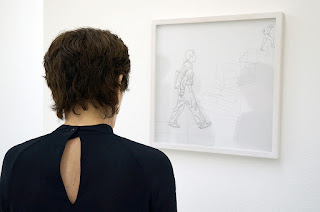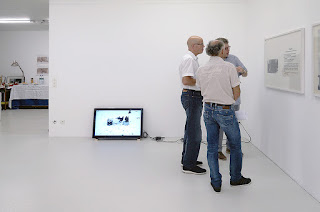English
PERSPECTIVES 2. ARTISTS IN THE
BERLA COLLECTION.
Adriana
Beretta, Andrea Crociani, Jose Dávila, Luca Frei, Alex Hanimann, Jakob Kolding,
Ugo Rondinone
Opening on Saturday
the 23rd of July 2016 at 5.30 p.m.
23 July – 2 October 2016
Fri-Sat-Sun from
2.00 to 6.00 p.m.
PERSPECTIVES
2. ARTISTS IN THE BERLA COLLECTION is the second event to be devoted by the MACT/CACT to private
collections: once again, this is a collection whose home is on the southern
slopes of the Alps. The aim of the exhibition is to pay tribute to the
collector by showing some of the works by Italian artists that he has collected
over the years: Adriana Beretta, Andrea Crociani, Jose Dávila, Luca Frei, Alex
Hanimann, Jakob Kolbing and Ugo Rondinone.
We have explored the dynamics of
private collecting as one of the roots of modern museology on several occasions
before today, unearthing not so much the sometimes disappointing market strategies
to be found in the framework of what is supposed to be a real passion for art, as
the authenticity of a work of art and of its collector. It is no coincidence
that the end-of-year exhibition being hosted by the MACT/CACT also touches
tangentially on a particular way of conceiving of the space of art and social
space: the Wunderkammer.
All too often, the image we have of
the post-contemporary collector is still that of the entrepreneur who makes an
investment, for whom an artist has a value because he is in demand on the
market of the day. It then follows that so many of the art collections we come
across in museums were compiled on the basis of this underlying criterion, in
which the exchange between money and artistic goods has acquired purely
commercial connotations: something that should actually be of no interest to a
museum as a place of culture. Should this phenomenon be traced back to
political and financial globalisation, or to the effect of the significantly
more trendy “country system” and of today’s hollow consumerism?
As things stand here in Canton
Ticino, after several years devoted to collecting works by contemporary
artists, the Berla collection constitutes the second phase and dimension of
collecting that relates osmotically and healthily to the art scene and in some
respects also to the scene of the institutions that surrounds it, since it has
already unquestionably put the nineteenth-century approach to “building a
collection” just described above behind it in the past. The offspring of such
twentieth-century avant-garde movements as constructivist abstraction in
general or the conceptual approach to language, without neglecting that touch
of Dada that steeps artistic making in playful aspects, the collector has a
preference for installation works by artists who identify with the concept of
minimalism or make use of primarily minimalist paradigms, ranging from painting
to photography and from drawing to video.
Regarding the situation that
pertains on the southern side of the Alps, where the relationship between
private and public has a tendency to become competitive in its profile and its
dynamics, the case of the Berla collection comes across as a reasoned locus of
the mind and of taste, one that is still graced by a chamber attitude, in which
the owner does his utmost to nurture a personal relationship with the artist
and with the art scene, something that has become rare indeed.
The simple authenticity of this
little collection that is growing gradually, following criteria that are not
merely commercial, brings the focus and attention back onto the true significance
of collecting historical testimonies or more simply of being a direct
testimonial of the art that we set out to collect, the kind that the collector
loves to have around himself.
To mark the occasion, the young art
historian Mattia Desogus has written a critical essay for the Cahier d’Art due to be published during
the exhibition, as a tribute to the collector.
Mario Casanova, 2016
Translation Pete Kercher
Italiano
ANGOLAZIONI 2. ARTISTI DELLA COLLEZIONE BERLA.
Adriana
Beretta, Andrea Crociani, Jose Dávila, Luca Frei, Alex Hanimann, Jakob Kolding,
Ugo Rondinone
Vernissage sabato 23 luglio 2016 dalle 17:30
23 luglio
– 2 ottobre 2016
Ve-sa-do dalle 14:00 alle 18:00
ANGOLAZIONI 2. ARTISTI DELLA COLLEZIONE BERLA costituisce il secondo
appuntamento che il MACT/CACT dedica alle collezioni private; anche in questo
caso presente a sud delle Alpi. L’esposizione intende omaggiare il
collezionista attraverso le opere di alcuni artisti ch’egli ha raccolto negli
anni; Adriana Beretta, Andrea Crociani, Jose Dávila, Luca Frei, Alex Hanimann, Jakob
Kolbing, Ugo Rondinone.
Più volte ci siamo calati nelle dinamiche del collezionismo privato
come genesi della museologia moderna, riportando alla luce non tanto le talvolta
deludenti strategie di mercato all’interno di quella che dovrebbe essere una
passione per l’arte, quanto piuttosto l’autenticità di un’opera d’arte e del suo
collezionista. Non è casuale che la mostra di fine anno del MACT/CACT vada a
lambire anche un particolare modo di concepire lo spazio d’arte e sociale; cioè
la Wunderkammer.
Ancora troppo spesso lo specimen del collezionista post-contemporaneo è
quello dell’imprenditore che investe, e per il quale un artista vale, poiché è sostenuto
dal mercato momentaneo, e le collezioni d’arte, che spesso ritroviamo poi nei
musei, nascono da questo criterio di base, laddove lo scambio tra denaro e
merce d’arte ha completamente assunto connotazioni puramente commerciali; ciò
che in effetti non dovrebbe interessare il museo, come luogo di cultura. Questo
fenomeno è da ricondurre alla globalizzazione politico-finanziaria o riconducibile
all’effetto del ben più modaiolo ‘sistema paese’ e di un consumismo ormai vuoto?
All’interno del panorama ticinese, la collezione Berla – dopo alcuni
anni di dedizione al raccogliere opere di artisti contemporanei – rappresenta
quella seconda fase e dimensione del collezionismo, che si rapporta in maniera
osmotica e sana alla scena artistica e in qualche modo anche istituzionale che
lo circonda, avendo già senza dubbio superato un approccio ottocentesco di quel
‘fare collezione’ poc’anzi citato. Figlio di movimenti avanguardisti
novecenteschi quali l’astrazione costruttiva in generale o l’approccio
concettuale al linguaggio, non senza tralasciare quel tocco Dada che intride di
aspetti ludici il fare a artistico, il collezionista predilige opere a
carattere installativo di autori che si rifanno al concetto o adoperano
paradigmi vieppiù minimalisti, spaziando essi dalla pittura alla fotografia,
dal disegno al video.
Nel panorama a sud delle Alpi, laddove il rapporto privato pubblico
assume contorni e dinamismi di tipo concorrenziale, nel caso della Collezione
Berla, essa rimane un luogo ragionato della mente e del gusto, ancora
fortunatamente ‘da camera’, dove il proprietario mantiene il più possibile
rapporti personali con l’artista e con l’ambiente dell’arte, cosa divenuta
ormai rara.
La semplice autenticità di questa piccola collezione che si ingrandisce
lentamente, seguendo criteri non meramente commerciali, riporta l’accento e
l’attenzione sul vero significato del raccogliere testimonianze storiche o più
semplicemente dell’essere testimone diretto dell’arte che si va a collezionare,
e di cui un collezionista ama circondarsi.
Per l’occasione il giovane storico dell’arte Mattia Desogus ha redatto
un testo critico per il Cahier d’Art che uscirà durante la mostra, in omaggio
al collezionista.
Mario Casanova, 2016
MACT/CACT Suisse enjoys the financial and cultural support of Republic and Canton of Ticino/Swisslos, City of Bellinzona, Alfred Richterich Stiftung Kastanienbaum, Friends of MACT/CACT, the Artists.
Special thanks are due to Luca Berla of the Berla Art Collection for the loan of works that made this exhibition possible.
MACT/CACT Arte Contemporanea Ticino è sostenuto
finanziariamente e culturalmente da Repubblica e Cantone del Ticino/Swisslos,
Alfred Richterich Stiftung Kastanienbaum, Città di Bellinzona, Amici del
MACT/CACT, i collezionisti e gli Artisti.
Un particolare ringraziamento va a Luca Berla
per aver reso possibile la realizzazione della mostra con il prestito delle
opere.
PHOTOGRAFPHIC DOCUMENTATION
Ph. Pier Giorgio De Pinto © PRO LITTERIS Zürich.
Ph. Pier Giorgio De Pinto © PRO LITTERIS Zürich.





























































































































